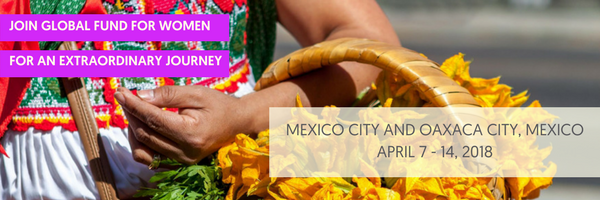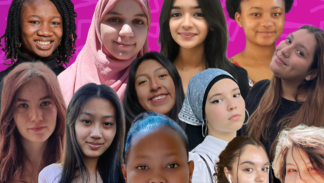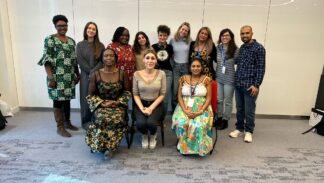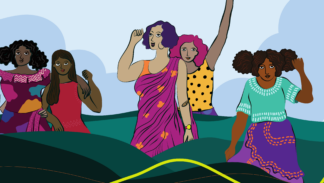Mexico 2018: Sample Grantee Partners

In partnership with Semillas, Global Fund for Women has identified a representative group of exemplary grantee partners with whom we will visit in Mexico—pending final schedules and coordination.
Comité de Mujeres de la Asamblea de Pueblos Indígenas del Istmo en Defensa de la Tierra y el Territorio (Oaxaca)
Comité de Mujeres de la Asamblea de Pueblos Indígenas del Istmo en Defensa de la Tierra y el Territorio was founded in Oaxaca in 2007. The organization’s mission is to defend the territory of indigenous peoples against megaprojects and to strengthen indigenous women’s capacity to participate in decision-making spaces and gain access to land. The organization offers trainings, workshops, and support for access to justice, promotion of reproductive health, defense of labor equity, denunciation of abuses and violations against indigenous women. Comité also works to strengthen women’s political leadership.
Comité’s work takes them to isolated regions within the Oaxaca isthmus, enabling indigenous women otherwise isolated from the women’s movement to actively participate. The work this group has been doing is causing waves in the region, and they are standing strong against injustice brought by big corporations supported by the Mexican government.
The influenceof this group’s grassroots organizing and reach is especially noticeable in the increasing threats of violence and coercive attempts to silence the leaders, who include Bettina Cruz (jailed twice for her efforts).
Consorcio para el diálogo parlamentario y la equidad Oaxaca, A.C.
Consortio – Oaxaca is an independent coalition of feminist activists created under the umbrella of Consorcio’s branch in Mexico City. Their mission is to propose and advocate legislative reform, specifically legislation against gender discrimination, in the state of Oaxaca.
Consorcio works to reform local policies, institutions, and decision-making processes in public spaces of power by strengthening women’s organizations’ political and strategic capacities and by building bridges and alliances between the feminist movement and the legislative system in Mexico. Since its creation, Consorcio has focused on improving parliamentary debate and knowledge of gender equality and women’s issues, particularly of indigenous women.
The group also works directly with women’s human rights defenders, providing legal support, doing advocacy locally and internationally for the rights of women’s human rights defenders, and providing trainings on self-care and self-protection. For this purpose, they created La Serena, as a space of refuge and rest for women’s human rights defenders, where they not only learn self-care techniques, but also strategies for their safety and well-being.
Consocrcio’s work also includes the recording, monitoring and diffusion of cases of violence against women, including femicides, in Oaxaca, and registering violence or threats against women’s human rights defenders. Their advocacy for the protection and support of women’s human rights defenders with international entities is well recognized in the region.
LuchadorasTV (Mexico City)
Established in 2011 in Mexico City and led by young women, LuchadorasTV aims for women to break open spaces on the internet and transform its male-dominated content. The organization trains young women on new technologies in order for them to tell stories from the point of view of women, with a feminist and human rights perspective.
LuchadorasTV looks to broaden content to include diverse voices of women across the spectrum of Mexican identities. The organization explores topics such as feminisms, territories, sexual and reproductive health and rights, individual empowerment and gender-based violence. Their vision is to cross borders with the help of new technologies, and achieve a feminist internet. Additionally, LuchadorasTV seeks to have online violence against women recognized as a problem in the public sphere, and to enable women to confront this issue with content that they create and own.
LuchadorasTV runs a “Women’s Voices” audio-visual production camp to open up spaces for women to be creators, authors, and owners of their own media content. It is their goal to expand the camp program to other states, and to focus the media-making training on health rights with topics such as menstruation, childbirth, safe abortion, and contraceptives. The idea is for women who participate to not only tell their stories but also to bring awareness to audiences from their communities as a way to break stereotypes and discrimination that young women and women in general face all over the country.
Semillas: Sociedad Mexicana Pro Derechos de la Mujer, A.C.
Semillas [Seeds—Mexican Society for Women’s Rights] was founded in 1990 in Mexico City as the first feminist philanthropic organization directed by and for women in Mexico. Semillas’ mission is to contribute to the construction of social culture and conscience that values women’s social and economic roles, including defending women’s rights in all planes of life and human activity. It remains the only women’s fund in Mexico.
A grantmaking organization committed to fostering the empowerment of women in Mexico, Semillas provides direct support to women’s groups and promotes local, social change through philanthropy focused on the needs of women and girls. It provides project-specific grants to marginalized women through its Seed Grant Program (SGP) in the areas of women’s human rights; education and communication; the sexual and reproductive rights of young women; and economic autonomy.
Emilliene de Leon, former Executive Director of Semillas, has served as an advisor for Global Fund for Women on our Latin and Central American portfolio. Her expertise has allowed us to extend our support strategically to women’s organizations and to expand our network of allies, not only in Mexico, but also to other countries in the region.
Over the past 25 years, Semillas has supported 745 projects, directly benefiting 613,089 women and indirectly reaching 2.2 million people throughout the whole country, including its 31 states and Mexico City.
Clóset de Sor Juana AC (Mexico City)
Clóset de Sor Juana is a lesbian feminist association working for the defense and promotion of women’s human rights, especially women who are discriminated against due to their sexual orientation or gender identity. Their vision is that of a world where all women, regardless of their sexual orientation or gender identity, can exercise their human rights and citizenship to reach their full potential.
Clóset de Sor Juana documents and generates information about the situation of LBT women’s human rights in Mexico. They advocate for the rights of LBT people in a range of spheres, including education, government, and the health system. In collaboration with other lesbian and trans organizations they also aim to create diverse strategies for the advancement of LBT women’s human rights in cultural spheres, including working with artists and participating in feminist political networks and LGBTI networks at local, national and international levels.
Centro Para los Derechos de la Mujer Nääxwiin A.C. (Oaxaca)
Formed in 2000 by indigenous women from the Mixe region of Oaxaca, Nääxwiin has been recognized by UN Women as pioneers in their model of care and violence prevention strategies for indigenous women. They provide information, advice, training, education, and offer treatment and support on legal and health matters.
Professional Circle for Training with Gender Equality – Nduva Ndandi AC (Oaxaca) (Círculo Profesional para la Formación con Equidad de Género Nduva Ndandi AC)
The Professional Circle for the Creation of Gender Equality is a group of Indigenous women of Mixtec heritage from Oaxaca, organized to combat violence and discrimination. They promote sexual and reproductive rights and the retrieval of ancestral knowledge.


